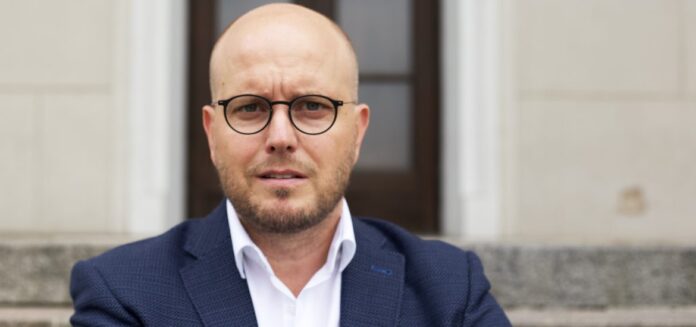
Rimas Čuplinskas is a Canadian and Lithuanian citizen born in Toronto, co-founder and Creative Director of Umlautmedia, a media and design agency based in Germany and Lithuania. He studied philosophy and computer science at the Rheinische Friedrich-Wilhelms University in Bonn (Germany) and was Director of the European Lithuanian Cultural Centre and Chairman of the Board of the private Lithuanian Secondary School in Germany (Vasario 16-tosios gimnazija). In 1990 he served as Secretary for Foreign Correspondence to Vytautas Landsbergis, first Head of State of the re-established Republic of Lithuania.
An active member of the Lithuanian World Community, he was interviewed by the Community magazine “Pasaulio lietuvis” (World Lithuanian) and spoke about his family – his well-known parents, Dr. Judita and Eugenijus Čuplinskas, and grandfather, Jonas Matulionis. The latter held important positions in Lithuanian political life before the Soviet occupation and continued in leadership roles for Lithuanian refugees in Germany, England and Canada. He was the first president of the Lithuanian Canadian Community, and the Lithuanian World Community. With his wife Aniceta, he passed on a legacy of Lithuanian spirit and identity to his daughter Judita and her husband and thus to his grandchildren.
Lithuanian cultural values were instilled in the family, and reinforced through activities in the sizeable Lithuanian community in Toronto. For Rimas, the consistent and exclusive use of Lithuanian at home was a key factor in shaping his Lithuanian identity. Speaking another language was not problematic, but original and meaningful, as he grew up in Canada where multiculturalism was encouraged. Having studied at the Lithuanian high school in Germany, and maintaining close ties with Lithuania, he is completely fluent, but concedes that fluency level is not necessarily fundamental to a person’s commitment to the future of Lithuania.
This commitment, deeply felt by his grandparents and parents as a constant fight against the injustice suffered by Lithuania, was the key to their activism and his: maintaining the language and also taking on some degree of responsibility for the future of Lithuania.
After a year of study at the Lithuanian high school in Germany, visits to Lithuania were arranged for students from abroad. Rimas’ first visit to Lithuania at age 17 shaped the course of his journey. Earlier, through youth organizations in Canada, he had corresponded with several Lithuanian dissidents, whom he contacted in Lithuania. At that time, in the late 80’s, the Freedom movement was gaining traction and he was well able to assist in conveying information about it to the Western press. Instead of returning to Canada, he decided to pursue his studies in Germany, and graduated from the high school with top grades.
In 1989, with the Freedom Movement in full force, there were many foreign correspondents in Vilnius, where Rimas became indispensable as a translator, and finally, in 1990, witnessed the Reinstatement of Lithuanian Independence on March 11. He was quickly recruited to be Vytautas Landsbergis’ foreign correspondence secretary, and though he had been admitted to study at Vilnius University, had managed only one semester of classes during this unprecedented and exciting historic period for Lithuania. Realizing that he needed to continue his studies, he enrolled at a university in Bonn. From philosophy and political science he eventually turned to neuroinformatics and systematic theology, graduated with a Master’s degree and taught at the same university for seven years.
Rimas’ community work continued with an online project “langas.net”, a collection of advice and information for Lithuanians studying abroad, with live meetings in Lithuania. He also became a member of the World Lithuanian Community Board, and in 2007 – the Board of the Lithuanian high school. He was a founder and director of the European Lithuanian Cultural Centre (beside the high school in Huttenfeld), later forced to close due to lack of funding. The events he initiated at the Centre became multicultural, because of his conviction that working on projects together with other ethnic communities was far more original than merely “presenting” Lithuanian culture to an audience. Because it appeared that Lithuania did not yet see itself as a full-fledged member of the European Union, those projects were meant to enhance the country’s position. Rimas believes that activities and communication with other groups will naturally create a country’s positive image. Those who have the courage of their convictions do not need to worry about constructing an “image”.
Currently living in Lithuania, Rimas is raising a family with his wife Agnė Ručytė.





























